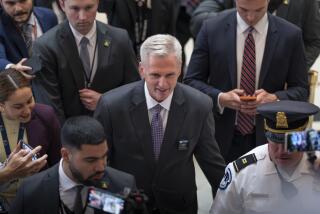House Panel Votes to Keep Cigarette Tax at 16 Cents a Pack to Help Reduce Deficit
- Share via
WASHINGTON — The House Ways and Means Committee voted in closed session Wednesday to make permanent the 16-cents-a-pack cigarette tax, rather than allow it to decline to 8 cents, as scheduled under current law.
When the tax was doubled under a sweeping tax bill in 1982, lawmakers had expected to let it expire next Oct. 1. However, as Congress struggles to deal with a soaring deficit, support has grown to retain the tax, which would add about $4.9 billion to federal revenues over the next three years.
The committee approved extending the tax on a voice vote, sources said.
Funds for Price Supports
In an effort to blunt opposition from tobacco-state congressmen, the committee voted also to devote 1 cent a pack from the revenues to the tobacco price-support program. However, it defeated on a tie vote a proposal to set aside an equal amount for Medicare. Similarly, it defeated an amendment that would have contributed 7 cents a pack to the National Cancer Institute.
Other proposals that failed included one to allow the additional tax to expire in three years and one that would have doubled the rate to 32 cents a pack.
In other action, the committee approved legislation by Rep. Harold E. Ford (D-Tenn.) that would require all states to provide benefits under the Aid to Families with Dependent Children program to needy two-parent families in which the principal wage earner is unemployed.
Only 23 states, including California, now offer such benefits. In most states, parents must separate to qualify for the welfare benefits.
In addition, the committee approved Ford’s bill authorizing a two-year, $150-million pilot project in which the AFDC program will offer counseling aimed at preventing teen-age pregnancies and will provide education and job training for teen-age parents who receive benefits.
Also approved by the committee was a proposal by Rep. Robert T. Matsui (D-Sacramento) to revise the system by which states are penalized for errors they make in administering welfare.
Aid for California
The plan would make states accountable only for those errors that result in misspent funds. Matsui said that it would significantly reduce the $35 million that California owes for errors made in 1981.
On Tuesday, the Ways and Means Committee, in a move that could prevent a $75-million cut in federal reimbursements earmarked for California hospitals next year, endorsed a delay in a scheduled revision of the formula used to calculate Medicare payments to the states.
By a slim 18-17 margin, the committee voted in favor of a proposal by Matsui that would place a one-year freeze on formula changes approved by Congress in 1983 that are gradually being phased in.
Matsui and top California hospital officials contended that the formula changes, although intended to prod hospitals into cutting costs, are being implemented too fast for medical facilities in many large urban states with high living expenses.
Without the delay, Matsui contended, many nonprofit hospitals in California and elsewhere could be forced to drastically curtail services to the poor.
Although the delay was not expected to add to the overall cost of funding the Medicare program during fiscal 1986, which begins Oct. 1, it was resisted by representatives from several small rural states.
California hospitals are expected to receive about $4 billion this year in Medicare payments for health care provided to patients admitted to hospitals, according to the California Hospital Assn., which represents about 500 private and public facilities.
More to Read
Get the L.A. Times Politics newsletter
Deeply reported insights into legislation, politics and policy from Sacramento, Washington and beyond. In your inbox twice per week.
You may occasionally receive promotional content from the Los Angeles Times.










